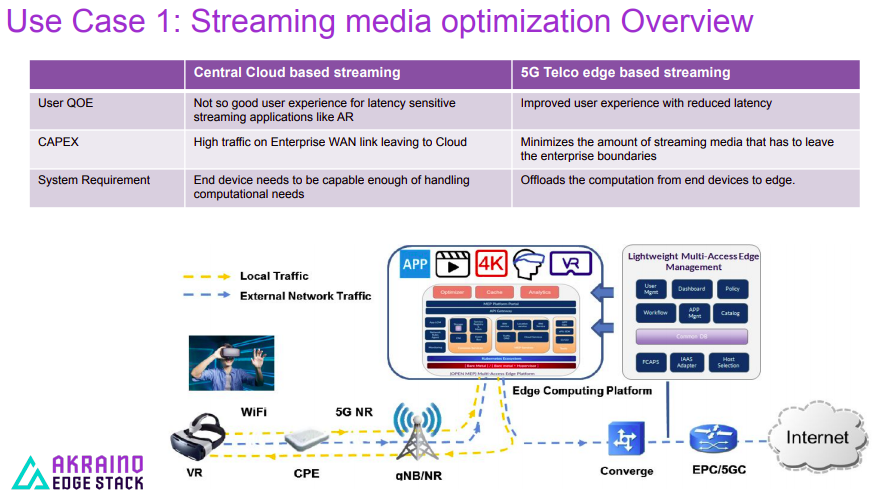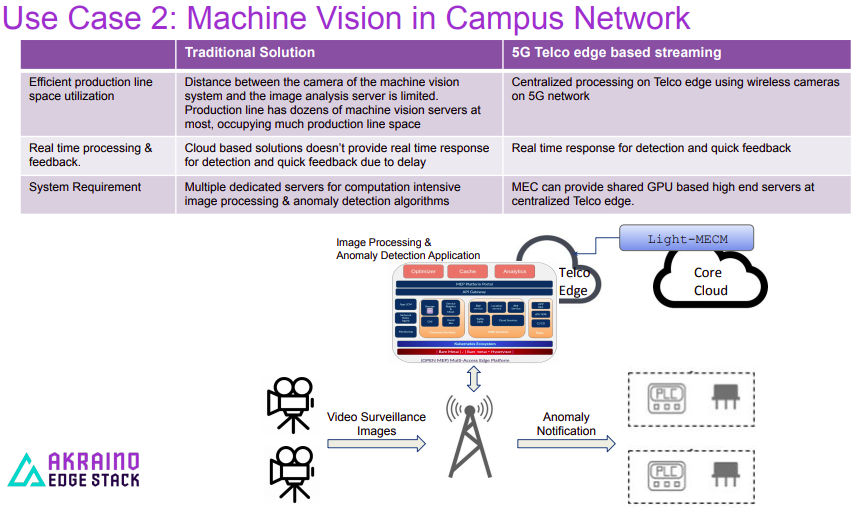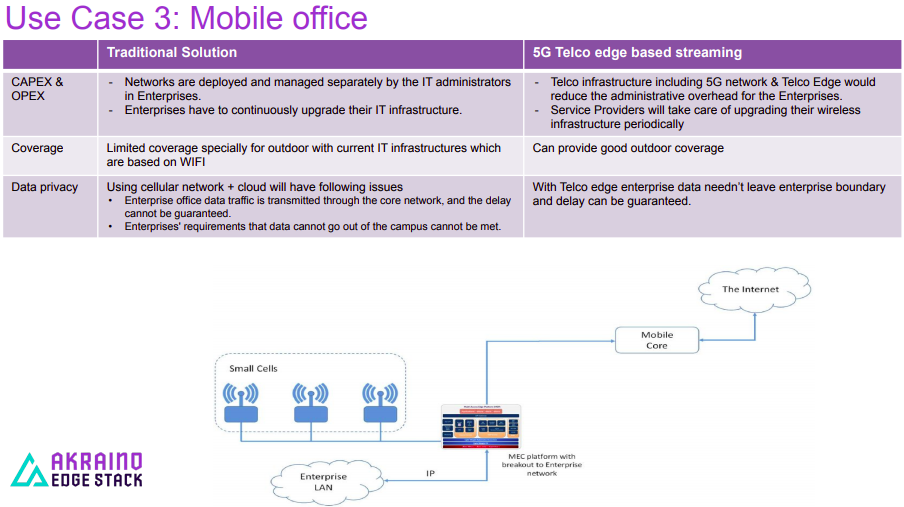Blueprint overview/Introduction
Enterprise Application on Lightweight 5G Telco Edge is an Akraino approved blueprint family, which intends to make a complete ecosystem for 5G Telco Edge Enterprise level platform. Platform which can be leveraged by various Telecom operators to give value added services to end users.
The edge layer which this blueprint targets is the Telco Edge.
Below are the high level features which this blueprint will go on to implement in phase wise.
- Lightweight MEP Solution
- Autonomous MEP Edge Sites.
- Unified Portal for platform management and for App developers.
- Sandbox with SDKs and tools chains for MEC app developers
- Heterogeneous deployment on Multi-Arch.
- ETSI MEC Compliant
Use Case
Lightweight MEC platform, enable real time enterprise applications on 5G telco edge.
Applications:
Diverse types of applications in various sectors, not limited to below:
● Gaming Applications, VR Live broadcasting
● Industrial park, Campus office etc.
● Video Orchestration and Optimization
● Latency Senstive Application for Enterprise scenarios Etc
Use Case 1
Use Case 2
Use Case 3
Business Drivers
The EALT Blueprint is for the Telco Edge, it targets the telecom operators to leverage this blueprint platform services and provide value added service, in return for better revenue generation. It also provide an Application Development Ecosystem by providing open SDK to developer community to develop application which can be deployed easily on the MEP sites.
Overall Architecture
The Enterprise Applications on Lightweight 5G Telco Edge platform architecture consists of a MECM (Controller) Cluster (Cloud) and single to multiple MEP Edge Sites .
The MECM Cluster is a Central Cloud Server which controls the deployment of applications on MEP Sites. The MECM node can be a single node or a multiple node K8S Cluster.
MECM Components:
- User Management Portal
- Application Management
- Dashboard for Monitoring MEP Sites.
- Workflow
- IAAS Adapter
- Policy
- FCAPS
- Host Selection
The MEP Sites are the components where the real action takes place. MEP components manages the execution of various Telco Edge Applications, it provides various services which can be leveraged by edge applications for smooth functioning and its planned to provide additional aPaas services like Machine Vision, Video Analytics , IoT Analytics etc in future releases. The MEP sites will be a single node or a multiple node K3S Cluster, on which applications will be deployed the MECM Application Management module. The MEP will be hosted on a light weight OS.
MEP Components:
- MEP Services – Location , RNI , Bandwidth , DNS.
- Event BUS
- Service Registry
- Monitoring
Platform Architecture
The below diagram gives a overall architecture of the Enterprise Application on Lightweight 5G Telco Edge blueprint which will be finally commissioned.
In the current release the components released are
In MECM :
- Dashboard
- APP Mgmt
- Common DB
In MEP :
- Monitoring
- Service Registry
- Event Bus
- CNI
- Lightweight Kubernetes EcoSystem.
Software Platform Architecture
The below image shows the software platform distribution and architecture for Release 3.0.
EALT Software Components
CLI : Command Line Interface provides the user interface to install the EALT environment.
APPLCM: MECM Module to deploy applications on MEP Cluster.
Service Registry : The service registry provides visibility of the services available on the MEC server. It uses the concept of loose coupling of services, providing flexibility in application deployment. In addition, the service registry presents service availability (status of the service) together with the related interfaces and versions. It is used by applications to discover and locate the end-points for the services they require, and to publish their own service end-point for other applications to use. The access to the service registry is controlled (authenticated and authorized).
Details of Upstream and Opensource softwares used in various nodes of EALT Environment.
OCD Node
S. No. | Software Name | Category | Version Number | Remarks |
|---|---|---|---|---|
| 1. | Ubuntu | OS | 18.04 | Supports both 16.04 and 18.04 |
| 2. | GIT | Version Control | ||
| 3. | Ansible | Scripting Tool | > 2.5 | |
| 4. | GoLang | Language | > 1.12 | |
| 5. | KubeSpray | Tool |
MECM Node
S. No. | Software Name | Category | Version Number | Remarks |
|---|---|---|---|---|
| 1. | Ubuntu | OS | 18.04 | Supports both 16.04 and 18.04 |
| 2. | Kubernetes | Orchestration | 1.16.0 | |
| 3. | Docker | CRI | 18.06 | |
| 4. | Helm | Application Package Manager | 3.0.2 | Running as Bin in MECM For ARM - 64 and X86 |
| 5. | Grafana | Analytics Dashboard | 6.5 | Running as POD in K8S Cluster |
MEP Node
S. No. | Software Name | Category | Version Number | Remarks |
|---|---|---|---|---|
| 1. | Ubuntu | OS | 18.04 | Supports both 16.04 and 18.04 |
| 2. | Docker | CRI | 18.06 | |
| 3. | K3S | Orchestration | ||
| 4. | Helm | Application Package Manager | 3.0.2 | Running as bin in MEP |
| 5. | Prometheus | Monitoring | 2.18 | Running in a POD in K3S Cluster. |
| 6. | cAdvisor | Container Metrics | Running in a POD in K3S cluster | |
| 7. | RabbitMQ | Message Queue | Running in a POD in K3S Cluster |
APIs
Currently no API are available.
Hardware and Software Management
Hardware Management
Currently for this blueprint Huawei Cloud Virtual Machines are being used for development , testing and CD hence there is no specific hardware management to be done.
Software Management
Gerrit Repo : EALT Gerrit Repo
Licensing
GNU/common license




